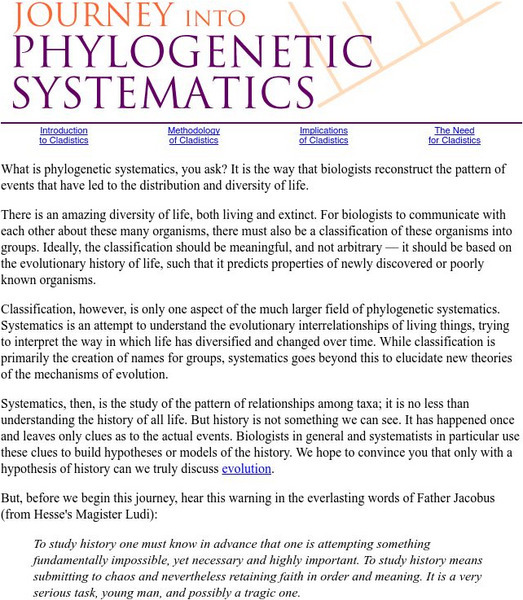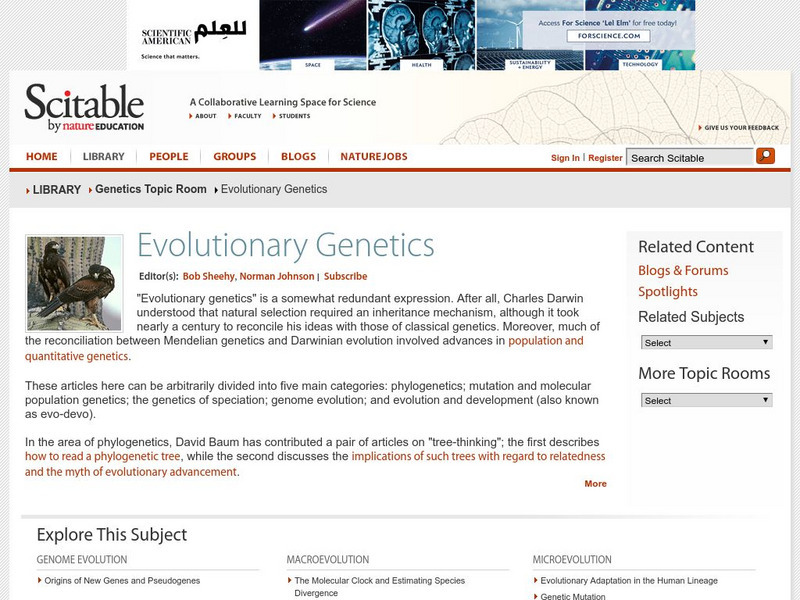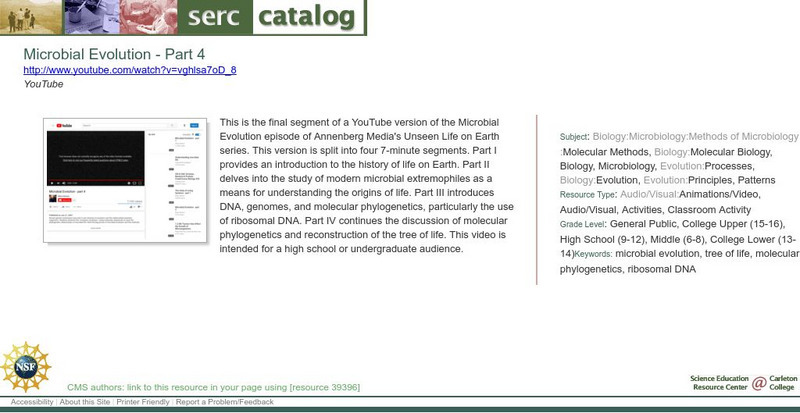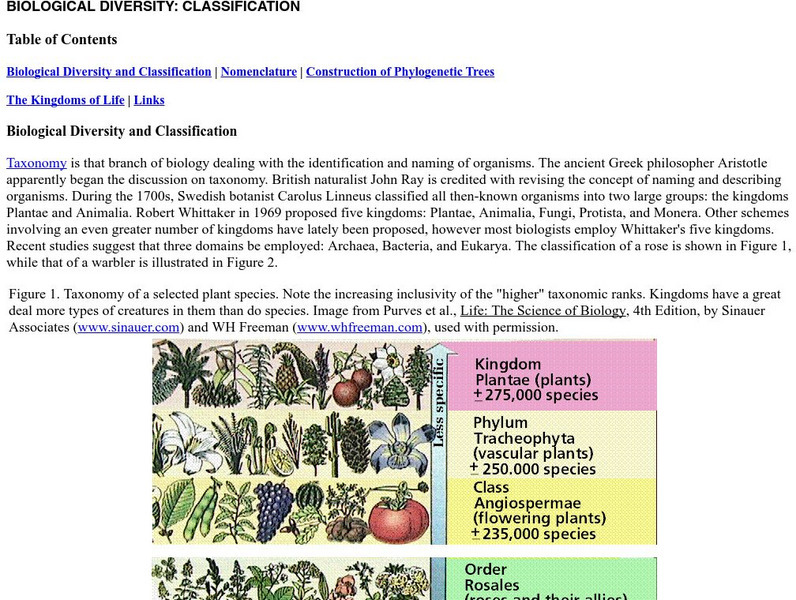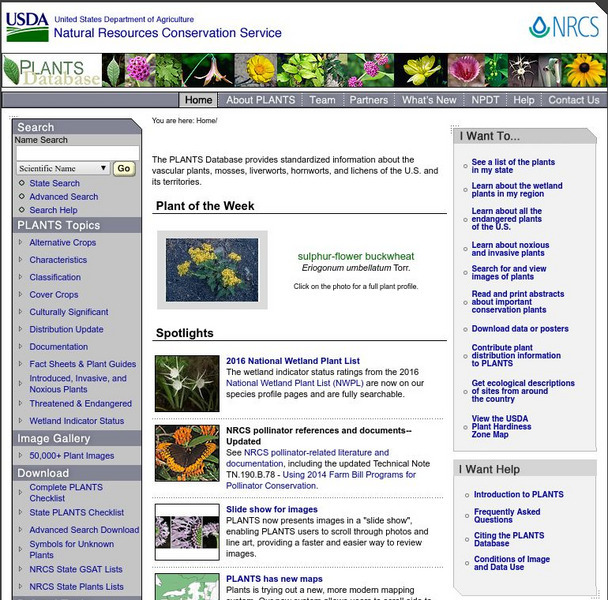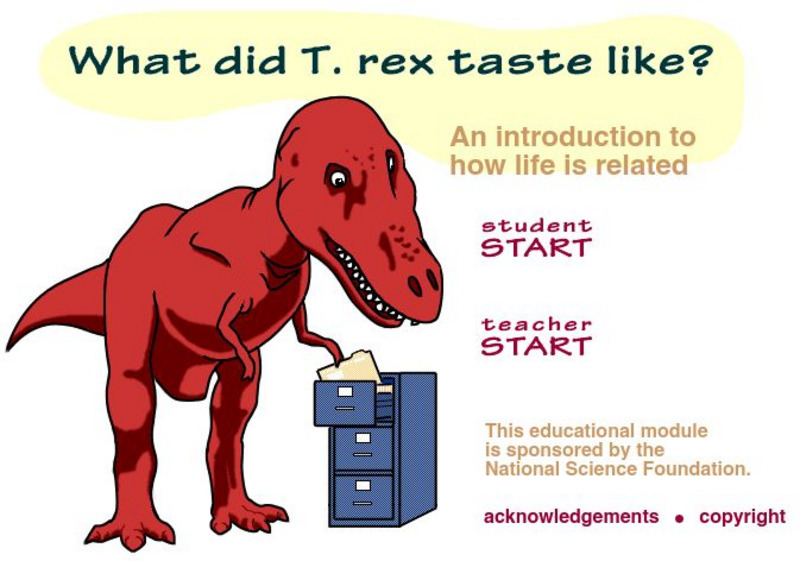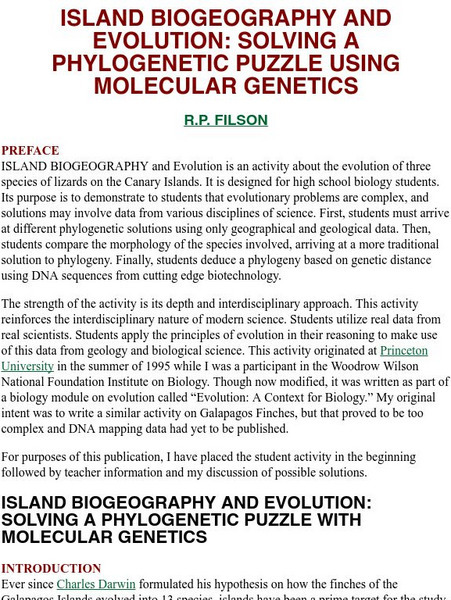National Health Museum
Access Excellence: Making a Phylogenetic Tree Lesson Plan
Constructing phylogenetic trees may be a daunting task for learners, but this lesson plan is a simulation of what molecular biologists must do to determine relationships. This plan is for students who have a good grasp of DNA structure...
University of California
Ucmp: Phylogenetic Systematics: Evolutionary Trees
This page provides an introduction to phylogenetic systematics, the way that biologists reconstruct the pattern of events that have led to the distribution and diversity of life. A tutorial "journey" into the Introduction, Methodology,...
Khan Academy
Khan Academy: Building a Phylogenetic Tree
Understand the logic behind phylogenetic trees. Learn how to build a tree using data about features that are present or absent in a group of organisms.
Science Education Resource Center at Carleton College
Serc: Phylogenetics Problems
A lesson plan where students solve problems by using cladistics to determine phylogenies. Problems require that students determine which characteristics are ancestral or derived by looking at both dinosaurs' remains and primate skulls....
McGraw Hill
Mc Graw Hill: Systematics and the Phylogenetic Revolution
Find out what you know about systematics and the phylogenetic revolution by taking this post test.
McGraw Hill
Mc Graw Hill:systematics and the Phylogenetic Revolution
Find out what you know about systematics and the phylogenetic revolution by taking this pre test.
Nature Research
Scitable: Evolutionary Genetics
A collection of articles on evolutionary genetics focusing on the topics of phylogenetics, mutation and molecular population genetics, the genetics of speciation, genome evolution, and evolution and development. Learn how to read a...
CK-12 Foundation
Ck 12: Episd: Evolution of Eukaryotes
[Free Registration/Login may be required to access all resource tools.] Take a close look at the endosymbiotic theory scientists have developed to explain the evolution of eukaryotes. Understand that chloroplast and mitochondria used to...
National Health Museum
Nhm: Amino Acid Sequences Show Evolution
This lesson plan focuses on differences in the amino acid sequence of hemoglobin and myoglobin proteins. They use the number of differences to create a phylogenetic tree.
Science Education Resource Center at Carleton College
Serc: Microbial Evolution: Part 4
YouTube video continues the discussion of molecular phylogenetics and reconstruction of the tree of life.
National Health Museum
Access Excellence: Molecular Biology/primate Phylogeny
This lesson plan involves comparison of amino acids to create a phylogenetic tree of primates. Students will also use other species information to draw conclusions about evolutionary relationships.
PBS
Pbs Learning Media: Nova Evolution Lab: Interactive Lesson: Mission 1
Explore the evidence of evolution with this interactive worksheet based off of NOVA's Evolution Lab. This resource is designed to be completed while playing through the Evolution Lab game and contains multiple choice and free response...
American Museum of Natural History
American Museum of Natural History: What Is a "Species"?
Explanation of different scientific approaches to defining the concept of species, using the red crossbill (a seed-eating finch) as an example. Learn what is meant by the biological species concept and the phylogenetic species concept.
Vision Learning
Visionlearning: Biology: Galapagos Finches
Interactive animation illustrates how Charles Darwin used his study of finch beaks to explain evolution. A phylogenetic tree diagram shows how the birds' color and beak shape changed over generations.
Howard Hughes Medical Institute
Hhmi: Bio Interactive: Lizard Evolution Virtual Lab
Students explore the evolution of the anole lizard in this virtual lab. Students will collect and analyze data during the virtual lab that focuses on evolutionary biology and includes adaptation, convergent evolution, phylogenetic...
Biology Pages
Kimball's Biology Pages: Cladistics
This page discusses how the cladistic level of classification includes information from molecular biology to establish evolutionary relationships. The page discusses how this information is used to do this.
Estrella Mountain Community College
Estrella Mountain College: Classification
Discusses many aspects of information pertainingto organism classification. Provides links to other areas in biology as well.
US Department of Agriculture
Usda: Plants National Database
This resource provides a database of standardized information on plants. Click on Photo Gallery to view photographs of various categories of plants, including noxious plants and crops.
University of California
Ucmp: What Did T. Rex Taste Like?
The title could be slightly misleading for this site. It is actually a teaching and learning module on the science of cladistics. As they go through the module, students will increase their understanding of, and appreciation for, the...
Other
University of Wisconsin La Crosse: Zoo Lab: A Resource for Animal Biology
A fantastic source of basic zoological information, a great supplement for all animal biology classrooms.
University of California
Ucmp: Island Biogeography and Evolution
This is a lesson designed by a biology teacher. In it, students use maps and evidence of island age, molecular genetics, morphology, and distance apart to determine how the islands came to be occupied by different species of lizards. It...
Science Buddies
Science Buddies: Neanderthals, Orangutans, Lemurs & You; A Primate Reunion
You have probably seen figures showing how human beings are related to chimpanzees, gorillas, and other primates. In this genomics science fair project, you will use bioinformatics tools to generate your own primate family tree.
McGraw Hill
Mc Graw Hill Higher Education: Classification
This site from McGraw-Hill Higher Education provides links to key terms, lecture notes, and readings on classification, as well as questions from Raven and Johnson's textbook reading on classification.

